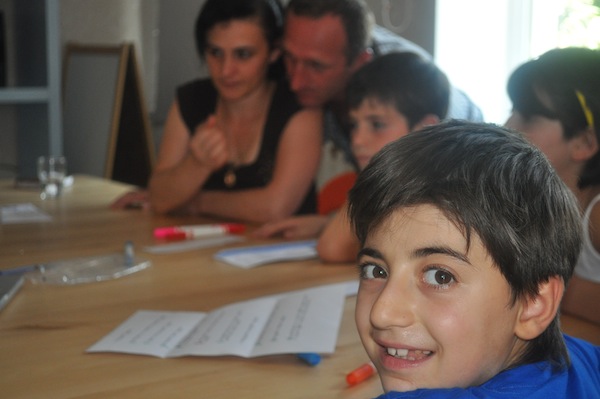
After a human rights training session, Georgian children talk about what right is most important to them:
“Every child of Georgia should have the right to live in a family.”
Lika Tstaishvili, 8, at a children’s home with her simulated family. / Photo by Roshan Nebhrajani
This is the driving force of Georgia’s latest initiatives aimed at ameliorating the living conditions of abandoned children. As shelters continue to swell, international bodies have begun to support the implementation of institutions roughly translated as, “children’s homes.” These homes strive to provide a family for those children who have been deprived of one. A maximum of eight children live in each home. A couple also lives in the home, providing intimate care and nurturing the children just as parents would.The Imeriti region’s children’s home opened only five months ago in Kutaisi, on January 12, 2010 with a sponsorship from Foundation Breath, a Netherland-based NGO. There are currently seven children living in the home, according to Natia Gudava, the home’s liaison between the government and Breath.
Nino Khukhua hosting a children’s seminar. / Photo by Roshan Nebhrajani
On Tuesday July 27, Senior project assistant Nino Khukhua hosted the first, of many, children’s rights training sessions at the Imeriti children’s home. At the time only five children were present, as two were spending time with their biological family.
Nana and Ana Chapidze supervise as Khukhua teaches. / Photo by Roshan Nebhrajani
JusticeMaker Nana Chapidze and project consultant Ana Chapidze supervised as Khukhua conducted prepared activities with the children. Through interactive dialogue and coloring projects, Khukhua communicated basic human rights to the children at a level they were able to understand.
Children at the children’s home coloring. / Photo by Roshan Nebhrajani
“Global children’s rights are not taught at schools, it’s important that the children receive the necessary level of education of human rights now, before they turn 18 and become independent,” Chapidze said. “Hopefully this project will encourage the state to teach juveniles human rights.”
Trainers, parents and children watch a video on the rights of a child. / Photo by Roshan Nebhrajani
For the next couple of months, Khukhua along with the project’s legal assistants will continue to host children’s rights training sessions at children’s homes and other institutions that host at-risk children.Watch pieces of the training session here: